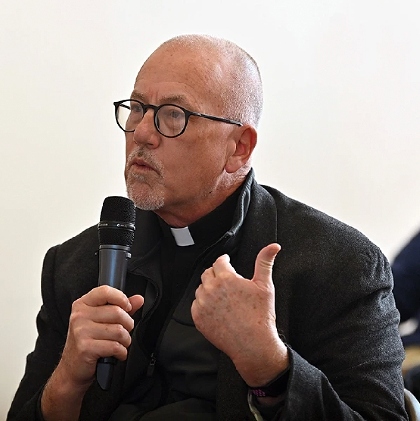What is a nation? What does it mean to belong to a nation? What does that belonging require? What is citizenship?
M. Shawn Copeland, Ph.D., Professor Emerita of Systematic Theology, the Department of Theology and the Program in African and African Diaspora Studies at Boston College, posed these questions during her lecture, “Competing and Changing Visions of Social Belonging,” held on November 21 in the D’Angelo Center on St. John’s University’s Queens, NY, campus.
Dr. Copeland is this year’s holder of the St. John’s University Vincentian Chair of Social Justice; the theme for her lecture series is “Visions of Freedom: A Political Theology for Our Time.” She will present three more lectures on similar topics throughout the 2022–23 academic year.

Dr. Copeland noted that the US Constitution has functioned as a social and racialized contract between and among free White persons as citizens constituting the republic. From the beginning, US citizenship was restricted to any free White person, tying citizenship to racial identity. It disempowered all women and ethnic minorities deemed as “non-White.”
A nation is an imagined political community, Dr. Copeland posed. “As both inherently limited and sovereign, it is imagined because the members of even the smallest nation will never know most of their fellow members. Yet, in the mind of each lives the image of communion.”
Because human beings are social creatures by nature, the desire to belong is integral to who we are, Dr. Copeland said. “Belonging implies an emotional attachment, a feeling of ‘at-homeness,’” she added. Human beings find meaning in participation and acceptance in certain groups, whether in a family, neighborhood, city, town, country, town, school, or religious group.
Through those associations, Dr. Copeland explained, group belonging often leads to comparison with others. “Too often it constructs identity through labeling some group or nation as inferior while defining ourselves as superior, or by stereotyping some person, group, or nation as flawed and deficient while presenting ourselves as flawless and exemplary. Such behavior undermines authentic values of human belonging.”
Different segments of a nation’s population may or may not have easier or more difficult access to these rights outlined in its constitution.
“Across our geographic landscape the very land upon which we live conjures memories of rejection and alienation—harrowing, violent stories of nation building in which Indigenous, African, Mexican, Hispanic Latino, and Asian peoples are driven to geographic, sociopolitical, economic, cultural, and religious margins,” Dr. Copeland explained, adding that the early years of this country promoted unity while disregarding diversity.
“Such unity is never simply given,” she stressed. “It must be forged in actions rooted in authentic respect for the life and dignity of other human persons.”
Prior to the lecture, a group of students majoring in Critical Race and Ethnic Studies had dinner with Dr. Copeland in the D’Angelo Center for a more in-depth discussion of the topics presented in her lecture.
“It was enlightening to see things presented from a theological perspective,” said student William Pierre-Francois. “People often ask ‘What does theology have to do with modern-day society?’, but theology, sociology, and psychology are all partners in this society of ours.”
“It was great to see how much Dr. Copeland cares about students’ voices, especially people who are devoted to learning about equity and inclusion in a true sense,” said student Sandyha Shyla Nath. “You can’t just say it’s a priority. You have to listen to what people’s needs are and incorporate them. In Dr. Copeland, we see someone who cares about what we want and what we’re doing.”
“Dr. Copeland continues to lead the St. John’s community along the path of political theology,” noted Rev. Patrick J. Griffin, C.M. ’13HON, Executive Director, Vincentian Center for Church and Society. “What becomes clear is that this valuable description of belonging becomes restricted to certain individuals of a particular color, social class, and religious background. ‘Americanization’ is that process of inclusion and exclusion. Dr. Copeland demonstrates that citizenship separates more than it unites.”
Learn More about St. John’s University: https://www.stjohns.edu/
